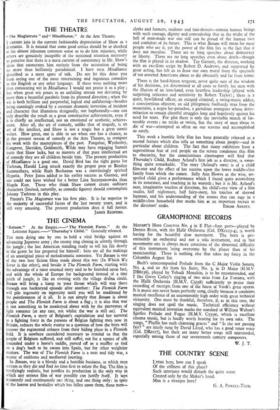GRAMOPHONE RECORDS
MOZART'S Horn Concerto No. 4 in E Flat—four parts—played by Dennis Brain, with the Hall6 Orchestra (Col. DX' iz3-4), is worth having for the beautiful stow movement. The horn is. pre- eminently an orchestral and not a solo instrument, and in fast movements one is always more conscious of the abnormal difficulty of this instrument being overcome by the player than of his musicianship. There is nothing else that takes my fancy in the Columbia August Est.
Bach's unaccompanied Prelude from the C Major Violin Sonata, No. 4, and an Air from his Suite, No. 3, in D Major (H.M.V. DB6156), played by Yehudi Menuhin, is to be recommended, and I like Gwen Carley's singing of two arias from La Travitaa, with the 'Halle Orchestra (H.M.V. 03358) sufficiently to praise their recording of excerpts from one of the finest of Verdi's great operas. It is music one never hears perfectly sung, chiefly because it combines musical excellence of an uncommonly high order with great technical virtuosity. One must be thankful, therefore, if, as in this case, the singing does not spoil the music. Technical efficiency without equivalent musical invention marks the standard of William Walton's Spitfire Prelude and Fugue (H.M.V. C3359), which is excellent cinema music, but is hardly worth hearing for its awn sake. The songs, " Phyllis has such charming graces " and " Is she not passing fair? " are nicely sung by David Lloyd, who has a good tenor voice (Col._ DRatia), but their are many better songs still Unrecorded, especially among those of our seventeenth century composers.
W. J. T.


























 Previous page
Previous page